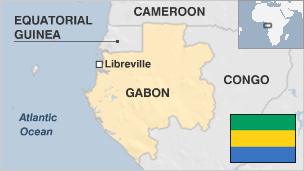

-
5 May 2015
- From the section Africa

Gabon, located on the west coast of Africa astride the Equator, is one of the region’s more stable countries. Between independence from France in 1960 and 2009, Gabon had just two presidents. The late president Omar Bongo was in power for over four decades.
Despite being made up of more than 40 ethnic groups, Gabon has escaped the strife afflicting many other African states.
This is partly down to its relative prosperity due to oil and to the presence of French troops, which in 1964 reinstated President Leon Mba after he had been overthrown in a coup.
Gabon’s dependence on oil has made its economy – and political stability – hostage to fluctuations in oil prices. When oil prices fell in the late 1980s, opposition to President Bongo increased, culminating in demonstrations in 1990.
These ushered in political liberalisation. A multi-party system was introduced in 1991.
Government critics have pointed to the wealth gap between the urban elite and the rural poor.
Thanks to its oil exports and a small population it enjoys more wealth per head of population than many of its neighbours.
However, most of its people live in poverty.
As oil reserves diminish, eco-tourism could grow in economic importance.
Gabon’s rainforests teem with wildlife, including lowland gorillas and forest elephants.
National parks make up around one tenth of the land area.

